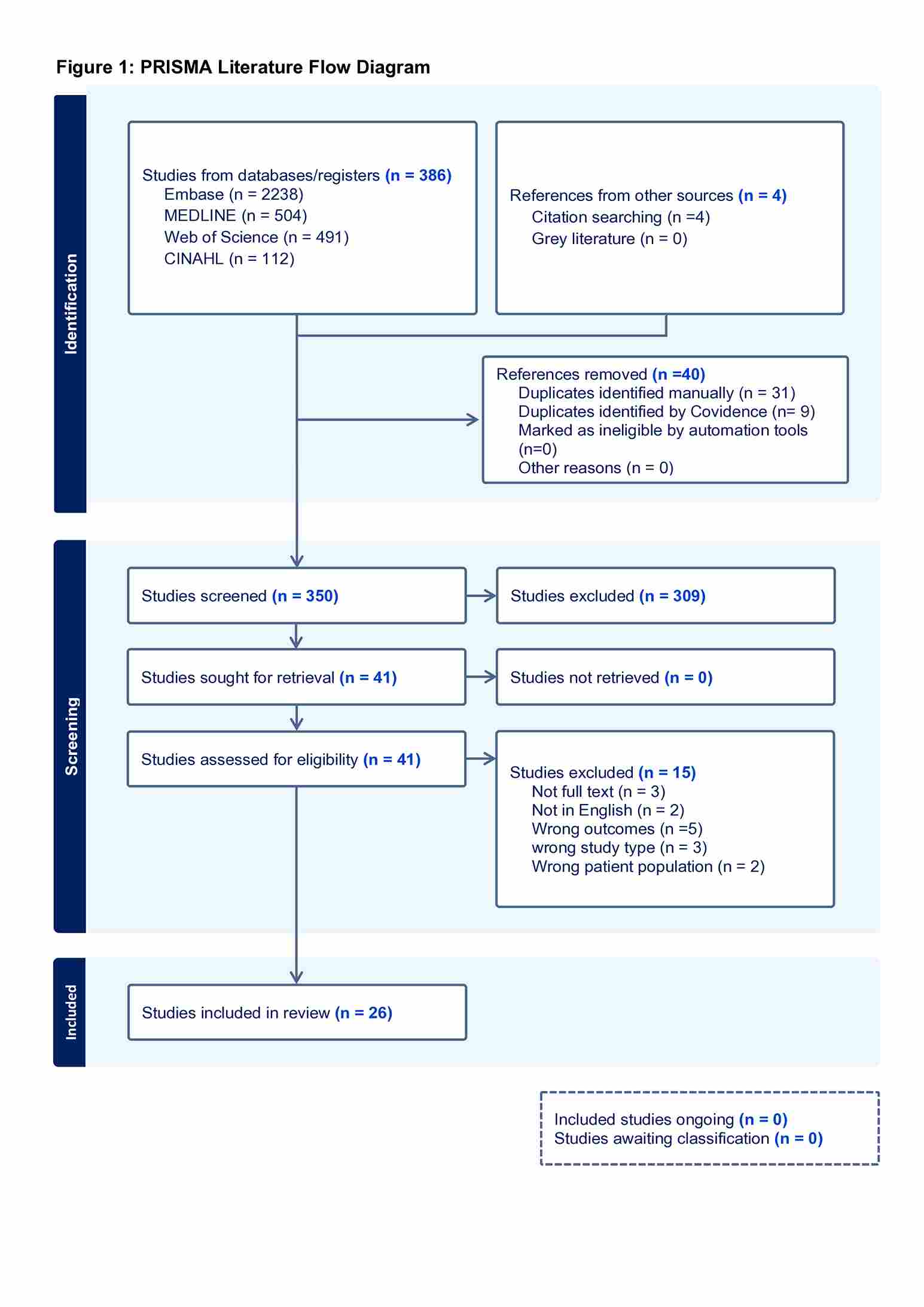Monday Poster Session
Category: Biliary/Pancreas
P2217 - Depression as a Potential Prodrome of Pancreatic Cancer: A Systematic Review of Clinical and Biomarker-Based Evidence
Monday, October 27, 2025
10:30 AM - 4:00 PM PDT
Location: Exhibit Hall

Melissa Frangie Machado, BS (she/her/hers)
Nova Southern University, Moffitt Cancer Center
Lakeland, FL
Presenting Author(s)
Amir Alishahi Tabriz, PhD1, Melissa Frangie Machado, BS2, Megan Centrella, 3, Tariq Rahaman, 4, Leila Azari, MD5, Kami Mukenschnabl, DO6, NilooFar Masoumi, PharmD7
1Moffitt Cancer Center, Lutz, FL; 2Nova Southern University, Moffitt Cancer Center, Tampa, FL; 3Nova Southeastern University, Clearwater, FL; 4Mayo Clinic, Jacksonville, FL; 5University of South Florida Morsani College of Medicine, Durham, NC; 6Mount Sinai Medical Center, Miami, FL; 7Ronak Pharmaceutical Co., Tampa, FL
Introduction: Pancreatic cancer (PC) is a highly lethal malignancy, often diagnosed at advanced stages due to the absence of early symptoms. Depression is commonly observed in patients with PC and may precede diagnosis, raising the possibility of a biologically mediated prodromal phase. This systematic review evaluates the temporal association between depression and PC and explores potential underlying biological mechanisms, with a focus on cytokine-related biomarkers.
Methods: A systematic review was conducted in accordance with PRISMA guidelines, searching MEDLINE, EMBASE, Web of Science, and Cochrane databases through February 2025. Studies were included if they evaluated adult patients with PC and assessed either psychiatric symptoms or biomarker-mediated pathways. Two reviewers independently conducted study selection, data extraction, and quality appraisal using NIH assessment tools.
Results: Of 390 citations screened, 26 studies met inclusion criteria. Reported depression prevalence among PC patients ranged from 3.5% to 51.8%. Multiple studies demonstrated significantly higher depression rates in PC compared to other cancers or non-cancer controls. Six epidemiological studies found depression commonly preceded PC diagnosis, often within 3–6 months. One large U.S. claims-based study (n > 100,000) found stronger associations between depression and PC than with other gastrointestinal cancers (OR 4.6; 95% CI 1.07–19.4). Four biomarker-focused studies reported elevated interleukin-6 (IL-6), C-reactive protein (CRP), kynurenine pathway activation, and reduced TGF-β in depressed PC patients, suggesting tumor-driven immune dysregulation.
Discussion: Depression may represent an early clinical indicator of PC, potentially mediated by inflammatory processes. Elevated IL-6, CRP, and kynurenine pathway alterations support a biologically plausible mechanism. Future research should prioritize prospective designs and biomarker validation to enable earlier detection and intervention.

Figure: Preferred Reporting Items for Systematic Reviews and Meta-Analyses (PRISMA) Literature Flow Diagram
Disclosures:
Amir Alishahi Tabriz indicated no relevant financial relationships.
Melissa Frangie Machado indicated no relevant financial relationships.
Megan Centrella indicated no relevant financial relationships.
Tariq Rahaman indicated no relevant financial relationships.
Leila Azari indicated no relevant financial relationships.
Kami Mukenschnabl indicated no relevant financial relationships.
NilooFar Masoumi indicated no relevant financial relationships.
Amir Alishahi Tabriz, PhD1, Melissa Frangie Machado, BS2, Megan Centrella, 3, Tariq Rahaman, 4, Leila Azari, MD5, Kami Mukenschnabl, DO6, NilooFar Masoumi, PharmD7. P2217 - Depression as a Potential Prodrome of Pancreatic Cancer: A Systematic Review of Clinical and Biomarker-Based Evidence, ACG 2025 Annual Scientific Meeting Abstracts. Phoenix, AZ: American College of Gastroenterology.
1Moffitt Cancer Center, Lutz, FL; 2Nova Southern University, Moffitt Cancer Center, Tampa, FL; 3Nova Southeastern University, Clearwater, FL; 4Mayo Clinic, Jacksonville, FL; 5University of South Florida Morsani College of Medicine, Durham, NC; 6Mount Sinai Medical Center, Miami, FL; 7Ronak Pharmaceutical Co., Tampa, FL
Introduction: Pancreatic cancer (PC) is a highly lethal malignancy, often diagnosed at advanced stages due to the absence of early symptoms. Depression is commonly observed in patients with PC and may precede diagnosis, raising the possibility of a biologically mediated prodromal phase. This systematic review evaluates the temporal association between depression and PC and explores potential underlying biological mechanisms, with a focus on cytokine-related biomarkers.
Methods: A systematic review was conducted in accordance with PRISMA guidelines, searching MEDLINE, EMBASE, Web of Science, and Cochrane databases through February 2025. Studies were included if they evaluated adult patients with PC and assessed either psychiatric symptoms or biomarker-mediated pathways. Two reviewers independently conducted study selection, data extraction, and quality appraisal using NIH assessment tools.
Results: Of 390 citations screened, 26 studies met inclusion criteria. Reported depression prevalence among PC patients ranged from 3.5% to 51.8%. Multiple studies demonstrated significantly higher depression rates in PC compared to other cancers or non-cancer controls. Six epidemiological studies found depression commonly preceded PC diagnosis, often within 3–6 months. One large U.S. claims-based study (n > 100,000) found stronger associations between depression and PC than with other gastrointestinal cancers (OR 4.6; 95% CI 1.07–19.4). Four biomarker-focused studies reported elevated interleukin-6 (IL-6), C-reactive protein (CRP), kynurenine pathway activation, and reduced TGF-β in depressed PC patients, suggesting tumor-driven immune dysregulation.
Discussion: Depression may represent an early clinical indicator of PC, potentially mediated by inflammatory processes. Elevated IL-6, CRP, and kynurenine pathway alterations support a biologically plausible mechanism. Future research should prioritize prospective designs and biomarker validation to enable earlier detection and intervention.

Figure: Preferred Reporting Items for Systematic Reviews and Meta-Analyses (PRISMA) Literature Flow Diagram
Disclosures:
Amir Alishahi Tabriz indicated no relevant financial relationships.
Melissa Frangie Machado indicated no relevant financial relationships.
Megan Centrella indicated no relevant financial relationships.
Tariq Rahaman indicated no relevant financial relationships.
Leila Azari indicated no relevant financial relationships.
Kami Mukenschnabl indicated no relevant financial relationships.
NilooFar Masoumi indicated no relevant financial relationships.
Amir Alishahi Tabriz, PhD1, Melissa Frangie Machado, BS2, Megan Centrella, 3, Tariq Rahaman, 4, Leila Azari, MD5, Kami Mukenschnabl, DO6, NilooFar Masoumi, PharmD7. P2217 - Depression as a Potential Prodrome of Pancreatic Cancer: A Systematic Review of Clinical and Biomarker-Based Evidence, ACG 2025 Annual Scientific Meeting Abstracts. Phoenix, AZ: American College of Gastroenterology.
